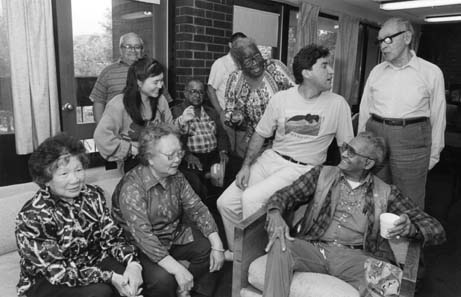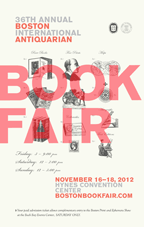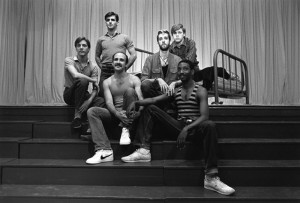Following the first set of Co-op reflections, yesterday, today we present our fellow Library Co-ops, Colin Parmalee, Archives Co-Op, Anthony Gentles, DMDS Co-op, and Kyle Maguire, Library Technology Services Co-op, sharing their Co-op experience over the past semester at the Snell Library as well — Karly
Colin:
I worked as the co-op student for the archives. I did a variety of work for the archives, mostly working on projects that last anywhere from a few hours to over a week. One of the major projects I worked on involved picking up a new donated collection, which involved going off-site and boxing and labeling the collection. I also worked on sifting through and describing new donations for press releases and for further archiving work. Most of my work involved current collections, going through unlabeled donations and adding descriptions. I learned a significant amount from this work, chiefly the prep work necessary for archiving materials as well as the process by which collections and processed and housed for the archives.
The most unexpected part (which, coincidentally, was also the best part) about working on the various projects was finding tidbits of history among these collections. Going through photo collections I would find recognizable historical figures or letters penned by famous people, which was fascinating. This is also what I’ll remember most, such as stumbling upon pictures of the Patriots from the 1970’s, or Reggie Lewis, or a letter from John F. Kennedy to an alum. Fascinating nuggets of history in the archives. In terms of advice to future co-ops, I would say that this is a great co-op for someone who hopes to work in a library or in a historical/archival position in the future. There’s a lot of great experience here and it’ll really help you going forward.
Anthony:
I began working as a co-op for the Digital Media Design Studio (or DMDS for short) during the first week of January 2012. There were several areas of the job that I were unsure about when I first began working (such as checking out equipment, certain answers for questions patrons had, rules and regulations for the recording room, etc.). However, the answers to these uncertainties all became very familiar after watching my supervisors handle the circumstances for a while.
Once the basics were learned, the job became fairly easy. Nearly all of the students who used the DMDS had similar questions and concerns as other students who came in. There were rarely moments when I asked Jonathan or Thomas for assistance because I did not know the answers myself. It was definitely a great feeling helping these students with their projects. It were as if I was teaching them skills they would have never learned while in the courses related to their specific majors.
Outside of answering questions whenever they would arise, I was also in charge of occasionally teaching workshops. These workshops were basic introductions to the editing software that we offered at the DMDS. Though many students are still unaware that the Library offers workshops for these programs, the students who did come into the DMDS were excited to be introduced to such programs. When workshops were not scheduled, often students would come to me for one-on-one help with these programs (generally for Final Cut Pro).
I was also involved with various media production projects for the Library and DMDS. My first major project involved creating an introduction video for the DMDS. This became a huge learning process for me, as well as the other members of the DMDS (in regards to having a smooth production schedule/process). This video took an unnecessarily longer timespan finish, due to much back-and-forth viewings of the video. After the project was finally complete, the DMDS and other members of the library came together to form a new system for future production projects. This new system was used in another media project I participated in (for the Library and Charlotte campus). The process for this video ran much smoother and efficiently in comparison to the first, proving our new system to be a success. I also created several posters and snippets for the Library/DMDS, which can be seen among the hallways and corridors of the library.
All in all, I would recommend this co-op position to any student who is interested or involved in media work. There is much that can be learned from your peers that work in the DMDS, as well as through your own personal training. The job will provide ample time to enhance your skills in a program you are familiar with, as well as educate you in new areas that may be less familiar.
Kyle:
I wasn’t sure what to expect when I first arrived at the library for my co-op. Never having worked in a library, I honestly wasn’t expecting much. I was pleasantly surprised. As I became more involved I began to realize what goes into organizing and maintaining a library, something that I would never have stopped to consider before coming here. I’m sure there will soon be a day where my friends laugh at me as I ramble on about the intricacy of library systems.
The project I’ve been involved with (the Digital Repository Service) is incredibly interesting and fun to work on. I cannot imagine a learning environment more suited to my needs. I was able to work very independently on the project and make design decisions on the fly, guided by the basic requirements for the system given to me by Patrick. This freedom, while initially daunting, required me to teach myself as I discovered new challenges and it really pushed me to expand and improve upon my skill-set.
I’ve greatly expanded upon my knowledge of PHP and JavaScript and I’ve picked up a lot of new knowledge about Linux systems and web servers, an area I had previously steered clear of. Not only did I gain these technical skills but I also improved upon my ability to organize and plan systems. The freedom given to me, along with the scale of the project, really let me practice this, as there were no strict specifications for what we were creating. The fact that I was only here temporarily also contributed to these gains, as I needed to document my work very clearly and create the pieces of the system modularly for future uses and implementations.
To any co-ops that come after me, I’d recommend that you be a fast learner and be able to make decisions independently and intelligently. Because the LTS department is relatively small, you need to be able to fend for yourself to an extent. If you’re up for it, though, it’s an incredible benefit of the position to be able to guide your own learning experience.
I also want to thank everyone here for being so warm and welcoming. Much thanks to Patrick for trusting me to work on his project and for being such a great boss, thanks to the LTS team for being so incredibly easy to work with, and thanks to everyone else I’ve met here for being so kind. It’s really a great work environment and a great community.



